Index relies entirely on the support of donors and readers to do its work.
Help us keep amplifying censored voices today.
[vc_row][vc_column][vc_column_text]
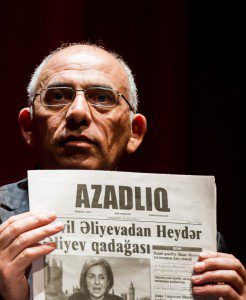
Rahim Haciyev, acting editor-in-chief of 2014 Index on Censorship Freedom of Expression Journalism Award-winning Azerbaijani newspaper Azadliq (Photo: Alex Brenner for Index on Censorship)
Civil, political and human rights are harshly restricted and frequently violated in Azerbaijan. Independent and critical journalists frequently find themselves — or their families — targeted.
Rahim Haciyev, acting editor in chief of the Index Award-winning independent newspaper Azadliq, was forced to flee Azerbaijan after years of official harassment. The government has repeatedly cracked-down on dissent.
Haciyev wrote to Index on Censorship from exile in a western European country:
I’m very sorry that the repressive policy of the Azerbaijani authorities against the Azadliq newspaper forced me to leave the country.
After the arrest of the newspaper’s financial director Faig Amirli, the authorities soon stopped issuing a print version. Amirli was arrested on obviously fabricated charges. I was summoned several times to the prosecutor’s office several times to testify about the paper’s financial affairs. The prosecutors said that this was connected with the criminal case of Amirli, but are invesitgating him under charges of “inciting religious hatred” and “violating the rights of citizens under the pretext of conducting religious rights”.
It turned out that they were interested in the financial issues of the newspaper in order to find a way to silence it. In addition, several employees of the newspaper were summoned for questioning. Then a court ordered tax authorities to comb through the paper’s financial activities. It’s clear that this was undertaken to increase pressure on the newspaper and me personally.
Aiming to cripple Azadliq, the government-owned distribution company was ordered to withhold circulation receipts — $84,000. So we weren’t able to print or even pay our bills. Three staffers are in prison — Seymur Hezi, Faig Amirli and Elchin. Each of them had sharply criticised the lawlessness and corruption of Azerbaijani officials.
In February, 11 Azadliq employees were summoned to the prosecutor’s offices to be interrogated again. Several government agencies increased their pressure on the newspaper’s online operation.
I had been warned twice in the past two years by the prosecutor general’s office that under my leadership Azadliq had been slandering Azerbaijani authorities. In their notices I was told that failure to comply with their terms would mean legal repercussions for me. But I refused. The newspaper continued to report on corruption, abuses of power and the absence of the rule of law. We were devoted to pursuing the truth.
And that is why the authorities intensified repression against the newspaper. Now this lawlessness has forced me to leave the country.
This decision was extremely difficult. I am cut off from my family and friends. I have two children and don’t know when I will see them again.
But despite all the problems I will continue to work daily for the newspaper’s website.
It’s my job, this is my job, this is my life.
Rahim Haciyev
Acting Editor-in-Chief, Azadliq
Haciyev is just one of the many journalists who have been targeted by Azerbaijani authorities in recent years. The country is ranked 163rd out of 180 countries in RSF’s 2016 World Press Freedom Index, which ranks 180 countries according to the level of freedom available to journalists. Almost everyone who speaks out against the regime of President Ilham Aliyev, including journalists, human rights defenders, activists and bloggers, are commonly imprisoned on spurious charges, such as drug and weapon possession, hooliganism and tax evasion. Reports of torture and abuse are typical by those being detained. At least 15 Azerbaijani prisoners of conscience currently remain in jail, including:[/vc_column_text][/vc_column][/vc_row][vc_row][vc_column width=”1/2″][vc_column_text]
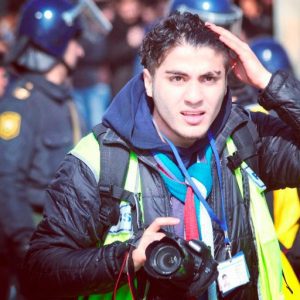
Mehman Huseynov (Twitter)
Mehman Huseynov, an Azerbaijani journalist and pro-opposition blogger, was sentenced to two years in jail on 3 March by a Baku court for defaming the police chief of the city’s Nasimi district. Huseynov intends to appeal his sentencing. According to Front Line Defenders, a group of police officers violently attacked Huseynov on 9 January. The next he was brought to court, found guilty of disobeying police orders and fined 200 manat (£96). [/vc_column_text][/vc_column][vc_column width=”1/2″][vc_column_text]
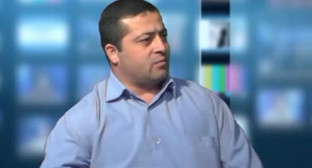
Elchin Ismayilli (IRFS.org)
Founder and editor of online news portal Kend.info Elchin Ismayilli was arrested on 17 February on charges of “extorting money” and “aggravated abuse of a position of influence”. According to the Caucasian Knot, he was also accused of blackmailing a local office, charges he insists were fabricated to silence his coverage of local corruption and human rights violations. On 18 February, Ismayilli was sentenced to a pre-trial detention period of 24 days. He has previously been subject to multiple arrests and cases of harassment related to his work as a journalist.[/vc_column_text][/vc_column][/vc_row][vc_row][vc_column width=”1/2″][vc_column_text]
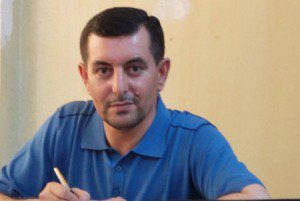
Faig Amirli (IRFS.org)
On 3 March, a court decided to prolong the period of investigation of Faig Amirli for three months, the Azerbaijan Press Agency reported. Amirli, financial director of newspaper and assistant chairman of the Azerbaijani Popular Front Party (APFP), was arrested on 20 August 2016 for “inciting religious hatred” and “violating the rights of citizens under the pretext of conducting religious rights,” according to Radio Free Europe/Radio Liberty.[/vc_column_text][/vc_column][vc_column width=”1/2″][vc_column_text]

Rashad Ramazanov (IRFS.org)
Writer and blogger Rashad Ramazanov was arrested on 9 May 2013 and sentenced to nine years in prison. According to English PEN, his charges included “illegal possession and sale of drugs”. Police claimed to have found nine grams of heroin on his body, although Ramazanov insists that the drugs were planted by the officers, who he claims also beat him up and tortured him during interrogation. Ramazanov was sentenced to nine years in prison in November 2013 on a trumped-up drug trafficking charge. PEN International reported that on 23 January Ramazanov was moved to solitary confinement for 15 days, the reason for which remains unknown. On 7 February Ramazanov was released from solitary confinement, and his family was given permission to visit him.[/vc_column_text][/vc_column][/vc_row][vc_row][vc_column width=”1/2″][vc_column_text]
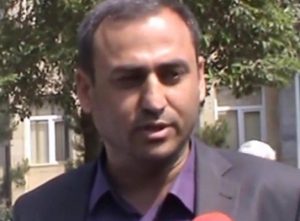
Afgan Sadigov. (IRFS.org)
Founder and editor of the website Azel, Afgan Sadygov, was sentenced on 12 January to 2.5 years in jail. Sadygov was arrested on 22 November 2016 based on accusations of “hooliganism” after he was attacked on 9 August 2016 and allegedly hit a woman, Contact Online news reported. Sadygov’s website often reports on issues such as poor infrastructure maintenance, bad quality of roads and waste of public funds in Azerbaijan’s Jalilabad region.[/vc_column_text][/vc_column][vc_column width=”1/2″][vc_column_text]
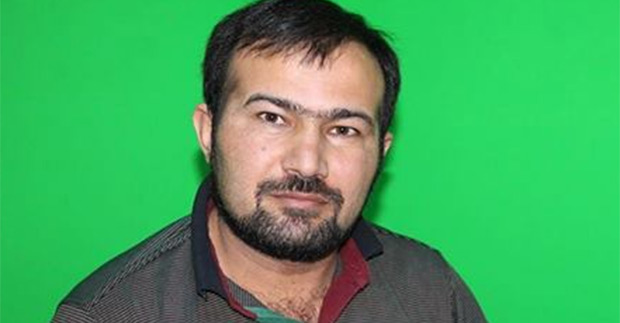
Seymur Hezi
According to MeydanTV, the Supreme Court will hear the appeal of Seymur Hezi, reporter for opposition news source Azadliq and presenter for critical TV program “Azerbaycan Saati” on 13 April. The journalist was sentenced to five years in prison on 29 January 2015 on a trumped-up charge of aggravated hooliganism, Index on Censorship reported. The charge came after Hezi was attacked on 29 August by Maherram Hasanov, a complete stranger, and defended himself. Hezi has accused President Ilham Aliyev and chief of staff Ramiz Mehdyev of ordering his arrest.[/vc_column_text][/vc_column][/vc_row][vc_row][vc_column width=”1/2″][vc_column_text]
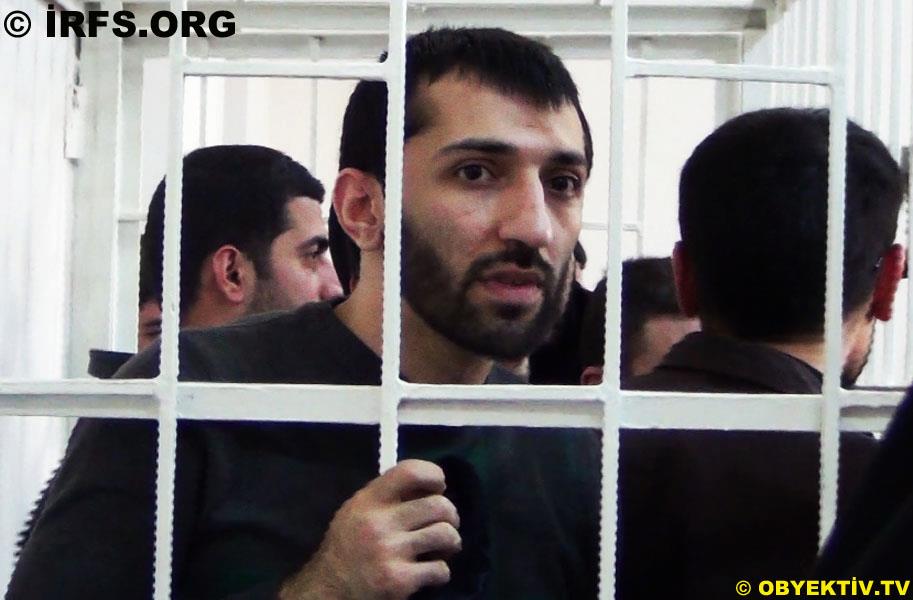
Nijat Aliyev. (IRFS.org)
The lawyer of Nijat Aliyev, former chief editor of religious website Azadxeber.org, has not been able to get hold of the text of the verdict of the Supreme Court of Azerbaijan for his client, Contact Online news reported. Aliyev’s lawyer believes that the delay has been intentional in order to prevent the filing of a complaint with the European Court of Human Rights, Contact Online news reported. According to IRFS, Aliyev was detained on 20 May 2012 and sentenced to 10 years in prison on 9 December 2013 on charges of illegal possession of drugs and weapons, incitement of religious hatred, calls to seize power and distributing banned religious literature. Aliyev’s website previously published criticisms of the government’s policies in regards to religion, the possibility of a LGBT parade in Baku and the allotment of too much funding for the Eurovision Song Contest in 2012, OCCRP reported.[/vc_column_text][/vc_column][vc_column width=”1/2″][vc_column_text]
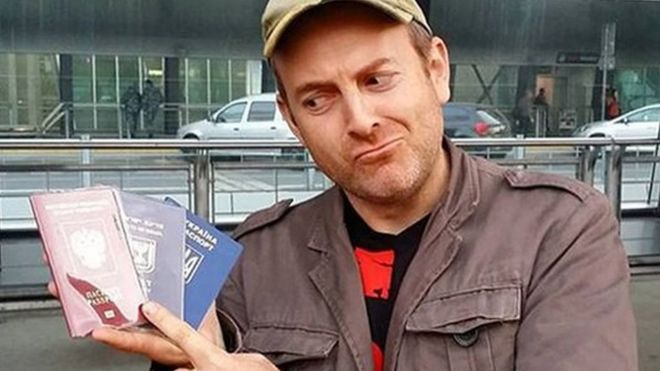
Alexander Lapshin (BBC)
Russian-Israeli travel blogger Alexander Lapshin was extradited from Belarus to Azerbaijan on 7 February. He faces up to five years in prison on charges of “public calls against the state” and “unauthorised crossing of borders,” according to Armenian News Agency ArmenPress. These charges came after Lapshin traveled to the disputed territory of Nagorno-Karabakh and sympathised in his blog entries with the Armenians he met, GlobalResearch reported. [/vc_column_text][/vc_column][/vc_row][vc_row][vc_column width=”1/2″][vc_column_text]
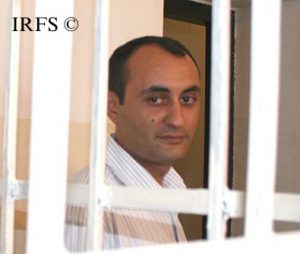
Fikrat Faramazoglu (IRFS.org)
Fikrat Faramazoglu, editor-in-chief of news website jam.az, has been detained since 30 June 2016 on the charge of extortion by means of threats, which is punishable by up to five years in prison. According to Azerbaijan Free Expression Platform, these charges originated when a local restaurant owner accused Faramazoglu of extorting money from him when asked to remove defamatory articles about the restaurant on websites owned by the journalist.[/vc_column_text][/vc_column][vc_column width=”1/2″][vc_column_text]
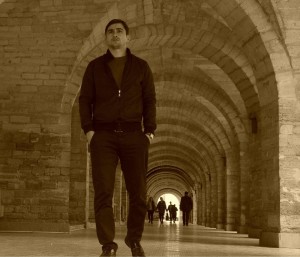
Abdul Abilov (IRFS.org)
Blogger and social media activist Abdul Abilov has been imprisoned since 22 November 2013. According to Azerbaijan Free Expression Platform, Abilov was charged with illegal possession, storage and manufacturing or sale of drugs when authorities claim to have found illegal drugs in his home and on his person, which Abilov continues to protest were planted on him. On 27 May 2014 Abilov was sentenced to five-and-a-half years in prison. Stop Sycophants!, the Facebook page previously run by Abilov, was shut down following his arrest, IRFS reported. The page was known to strongly criticise authorities.[/vc_column_text][/vc_column][/vc_row]
[vc_row][vc_column][vc_column_text]The undersigned organisations condemn in the strongest possible terms Friday’s sentencing of Mehman Huseynov, Azerbaijani journalist and chairman of the country’s leading freedom of expression group, Institute for Reporters’ Freedom and Safety, to two years in jail on defamation charges. He was taken into custody from the courtroom, without being allowed to speak in his defence.
The 24 organisations are deeply concerned by the continued targeting of Mehman Huseynov and call on the Azerbaijani authorities to immediately and unconditionally release him and all other political prisoners, and to reverse the continuous clampdown on freedom of expression occurring in the country.
“Today’s sentencing and jailing of Mehman Huseynov is outrageous – another example of Azerbaijan’s best and brightest being targeted for expressing opinions critical of the ruling Aliyev regime. It also shows that nothing has changed since the release of a number of high-profile political prisoners last year. The revolving-door policy of politically motivated arrests is still very much in place. Huseynov is now one of at least 13 journalists, bloggers, and media workers jailed in Azerbaijan. They must all be immediately and unconditionally released, in accordance with Azerbaijan’s international obligations”, said Rebecca Vincent, UK Bureau Director for Reporters Without Borders.
Huseynov’s conviction stems from criminal defamation charges in a private case brought by the chief of the police department, related to a report he published in which he wrote about his experience of torture, after he was detained overnight by police in January,
Mehman Huseynov was detained in Baku on 9 January by plain clothed police officers and held incommunicado overnight. Huseynov has reported that while in police custody, police placed a sack over his head and used force against him. He was convicted of disobeying police orders; and although the Court released him on 10 January, he was fined, and continued to face police harassment. The court has imposed a formal travel ban on Huseynov who already has been deprived of his travel documents for the past five years.
”Mehman Huseynov`s case is emblematic of the abusive and arbitrary methods used to punish and attempt to silence human rights defenders, journalists and activists.

Mehman Huseynov (Twitter)
must be released immediately and unconditionally, he has to have compensation for torture and ill-treatment, and those who are responsible for torture and ill-treatment, regardless of their position, have to be brought to justice. The international community must act, given the continued and increased repression against human rights defenders, journalists and lawyers in Azerbaijan. The dire human rights situation in Azerbaijan deserves the highest attention and action at the Human Rights Council.”, says Florian Irminger, Head of Advocacy, Human Rights House Foundation.
”We are shocked and deeply distressed by this shameful verdict, which is nothing but a mockery of justice. Azerbaijani law-enforcement agencies have earned notorious reputations for using brutal and unlawful interrogation methods. Instead of investigating the credible torture claims, the authorities have chosen to jail the blogger”, says Gulnara Akhundova, Head of Global Response, International Media Support.
Notably, Mehman Huseynov has been critical of the appointment of first lady Mehriban Aliyeva to the post of the Vice President on 21 February 2017.
“Prior to the appointment of first lady Mehriban Aliyeva to the post of the Vice President on 21 February 2017, the Azerbaijani government has pursued a new wave of detentions and harassment of activists, journalists and bloggers, apparently aimed at consolidating the government’s authoritarian rule and preventing any dissent around the controversial appointment.” says Sasha Koulaeva, Head of Eastern Europe-Central Asia Desk, FIDH.
Detentions of Political Opposition
Ahead of the Vice-Presidential appointment, since the amendment was passed in September, authorities have arrested several representatives of the political opposition on false, politically-motivated charges, including ten members of Azerbaijan Popular Front Party, one member of the Republican Alternative Movement (REAL) and one member of the D18 movement.
There are credible allegations of torture and other cruel and degrading treatment of the detainees. For example, Rahim Shaliyev, a REAL Movement member detained on 20 February and subsequently sentenced to 30 days administrative detention on charges of resisting police, reported to his lawyer that he was subject to beatings and humiliation, resulting in an injury to his skull.
Crackdown on media
Journalists have also been subject to arbitrary detention and harassment. On 17 February 2017 Elchin Ismayilli, founder and editor of Kend.info, an on-line news portal known for its reporting on corruption and human rights violations in the Ismayilli region of Azerbaijan, was detained by police. He is accused of threatening a local government employee and has been charged with extortion and abuse of a position of influence. Ismayilli denies all the charges. On 18 February, the Nasimi District Court sentenced Ismayilli to pre-trial detention for an initial period of 24 days. Ismayilli is currently being held in the Kurdakhani pretrial detention centre.
On 22 February, cable TV channels stopped all the authorities officially suspended all broadcasts by the Turkish affiliate of FOX TV, after the channel aired a satirical discussion on the appointment of the new Vice President. A spokesperson for the National Television and Radio Council (NTRC) of Azerbaijan stated that this decision was made at the sole discretion of cable providers; however, anonymous sources within the cable providers have reported that they faced pressure from the NTRC to drop the channel.
At the same time, the authorities have continued their harassment of opposition newspaper Azadliq, which was forced to cease abandon print publication in September 2016, following ongoing financial pressures from state-owned or affiliated companies. In the second half of February 2017, over ten staff members were summoned and interrogated by the Serious Crimes Investigation Department. The publication’s Financial Director, Faiq Amirov, and prominent journalist, Symur Hezi, have been incarcerated on trumped up charges since August 2016 and August 2014, respectively.
Activists expressing critical views on the internet and social media, the last bastion of freedom of expression, have also been subject to police pressure, aimed at forcing them to delete dissenting posts. For example, on 21 February Nisakhanim Valiyeva, the Chair of the Classical Popular Front Party was held in police custody for four hours, the same day that Merhiban Aliyeva was appointed Vice President, and released only after deleting her critical Facebook posts about the appointment.
This has been accompanied by calls for increased regulation of the internet and online content. The chair of the Press Council Aflatun Amashov, whose official mandate is to safeguard independent media and rights of journalists, has submitted a proposal to the Milli Majlis (Parliament), calling for mandatory registration of bloggers and activists, aimed at ensuring greater control over those expressing themselves online.
Harassment of critics in exile
The government of Azerbaijan is also pursuing government critics living in exile abroad. Shortly after giving a speech at the European Parliament on the human rights situation in Azerbaijan on 6 February, Emin Milli, head of Meydan TV, a critical TV channel operating in exile from Berlin, reported to German Police receiving threats of physical violence from the Azerbaijani authorities.
“The Azerbaijani authorities persistently violate freedom of expression and other human rights, both at home and abroad”, said Katie Morris, Head of Europe and Central Asia at ARTICLE 19. “With this happening in their own backyard, European governments can no longer ignore the arrests, torture and harassment of government critics and their families and must call the Azerbaijan government to account”, she added.
Where the authorities are unable to reach their critics, they have sought to harass family remembers remaining in Azerbaijan. Most recently, on the 22nd of February, the brother Dadashov Khanlar and nephew Sabuhi Zanalov of Netherlands-based blogger Ordukhan Teymurkhan, known for his criticism of the Aliyevs, were sentenced to 30 days detention on entirely bogus charges of disobeying police orders.
We, the undersigned organisations, call on the government of Azerbaijan to cease its harassment and detention of government critics. Allegations of torture must be investigated, and all political prisoners must be immediately and unconditionally released.
The relentless campaign waged by the authorities against media workers, bloggers, political activists, civil society and others that are deemed to threaten the power of the ruling regime must stop immediately.
We also call on the international community to exert political pressure and take all the necessary measures until Azerbaijan fully honours its human rights commitments.
ARTICLE 19
CEE Bankwatch Network
Committee to Protect Journalists (CPJ)
Crude Accauntability
Eastern Partnership Civil Society Forum
FIDH – Indernational Federation for Human Rights
Freedom House
Freedom Now
Front Line Defenders
Helsinki Foundation for Human Rights
Human Rights First
Human Rights House Foundation
IFEX
Index on Censorship
International Media Support
International Partnership for Human Rights
Institute for Reporters’ Freedom and Safety
Netherlands Helsinki Committee
Norwegian Helsinki Committee
PEN International
People in Need
Polish Green Network
Reporters Without Borders (RSF)
World Organisation Against Torture (OMCT)[/vc_column_text][vc_row_inner equal_height=”yes” content_placement=”middle” css=”.vc_custom_1488907664556{margin-bottom: 25px !important;background-color: #dd3333 !important;}” el_class=”text_white”][vc_column_inner width=”1/2″][vc_custom_heading text=”Protect Media Freedom” font_container=”tag:p|font_size:28|text_align:left” use_theme_fonts=”yes” link=”url:https%3A%2F%2Fwww.indexoncensorship.org%2Fdefend-media-freedom-donate-index%2F|||”][vc_column_text]
We monitor threats to press freedom, produce an award-winning magazine and publish work by censored writers.[/vc_column_text][/vc_column_inner][vc_column_inner width=”1/2″ css=”.vc_custom_1488907628643{background-image: url(https://www.indexoncensorship.org/wp-content/uploads/2013/08/newspapers.jpg?id=50885) !important;background-position: center !important;background-repeat: no-repeat !important;background-size: cover !important;}”][/vc_column_inner][/vc_row_inner][/vc_column][/vc_row][vc_row][vc_column][vc_basic_grid post_type=”post” max_items=”4″ element_width=”6″ grid_id=”vc_gid:1488907408421-e22a85a0-aabc-5″ taxonomies=”7145″][/vc_column][/vc_row]
[vc_row][vc_column][vc_column_text]
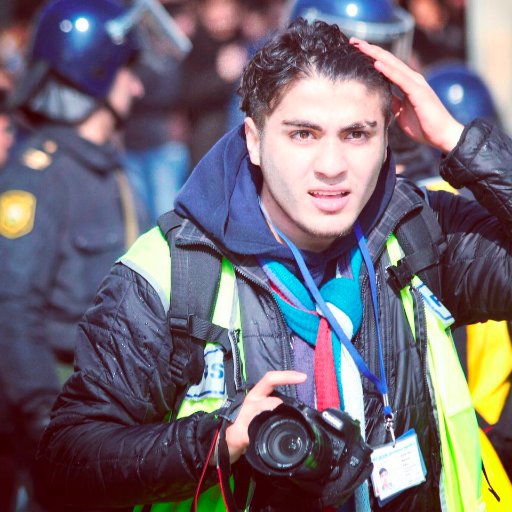
Mehman Huseynov (Twitter)
The undersigned organisations strongly condemn the abduction and torture of Azerbaijani journalist Mehman Huseynov and call on Azerbaijan’s authorities to immediately investigate the case and to hold those responsible accountable. Moreover, Huseynov’s conviction should be overturned and the travel ban against him lifted. We further call upon the Azerbaijani authorities to immediately and unconditionally release all journalists, bloggers and activists currently imprisoned in Azerbaijan solely for exercising the right to freedom of expression.
Mehman Huseynov, Azerbaijan’s top political blogger and chairman of the local press freedom group, Institute for Reporters’ Freedom and Safety (IRFS), the country’s leading press freedom group, was abducted in Central Baku at around 8 pm local time on Monday 9 January. He was pushed into a vehicle by unknown assailants and driven away. His whereabouts were unknown until early afternoon on Tuesday, when it emerged that Huseynov had been apprehended by unidentified police agents.
On 10 January, Huseynov was taken to Nasimi District Court, where he was tried on charges of disobeying the police (Article 535.1 of the Administrative Offences Code), which carries a sentence of up to 30 days in jail. The Court released him; however, he was fined 200 AZN (approx. 100 EUR).
Huseynov said he was tortured while in police custody. He reported being driven around for several hours, blindfolded and suffocated with a bag. He also said that he was given electric shocks in the car. On being brought to Nasimi District Police Department he lost consciousness and collapsed. An ambulance was called, and he was given painkillers and sleep-inducers by way of injection. His lawyers confirmed that his injuries were visible during the court hearing. The court also ordered that Nasimi district prosecutor’s office conduct investigation into Mehman Huseynov’s torture reports.
“We resolutely denounce this act of torture and wish Mehman Huseynov a rapid recovery,” said Gulnara Akhundova, the Head of Department at International Media Support. “All charges against Huseynov must be dropped unconditionally, and those responsible for his torture should be tried in an independent and impartial manner, as should those in the chain of command who are implicated”.
‘The fact the Mehman Huseynov was convicted of disobeying the police for refusing to get into the car of his abductors beggars belief. We know that the Azerbaijan authorities have a long history of bringing trumped up charges against writers and activists. His conviction should be overturned immediately’ said Salil Tripathi, Chair of PEN International’s Writers in Prison Committee.
“This is another example of continued repression against journalists in Azerbaijan, which is why RSF considers Aliyev a predator of press freedom. Huseynov is one of dozens of journalists and citizen journalists who remain under politically motivated travel bans. Although he has been released, he remains at serious risk. The international community must act now to protect him and other critical voices in Azerbaijan.” said Johann Bihr, the head of RSF Eastern Europe and Central Asia desk.
Although Huseynov’s family and colleagues had repeatedly contacted the police since his disappearance on 9 January 2017, they were not informed about his arrest until early afternoon the following day when he was brought to court. Hence, the undersigned organisations consider Huseynov’s abduction as an enforced disappearance, defined under international law as the arrest or detention of a person by state officials, or their agents, followed by a refusal to acknowledge the deprivation of liberty, or to reveal the person’s fate or whereabouts. The UN Working Group on Enforced or Involuntary Disappearances has repeatedly clarified that ‘there is no time limit, not matter how short, for an enforced disappearance to occur’. As a signatory of the International Convention for the Protection of All Persons from Enforced Disappearance (ICPPED), Azerbaijan is obliged to refrain from acts that would defeat or undermine the ICPPED’s objective and purpose.
Despite the much-lauded release of political prisoners in March 2016, the persecution of critical voices in Azerbaijan has accelerated in recent months. Currently, there are dozens of journalists and activists behind bars for exercising their right to free expression in Azerbaijan.
“The government has sought to destroy civil society and the media in Azerbaijan, while developing relations with Western states to secure lucrative oil and gas deals”, said Katie Morris, Head of the Europe and Central Asia Programme at ARTICLE 19.
“While the government may release a journalist one day, the following day they will arrest or harass others, creating a climate of fear to prevent people speaking out. The international community must clearly condemn this behaviour and apply pressure for systemic reform”, she added.
“We must stop the sense of impunity on attacks against journalists and human rights defenders in Azerbaijan, of which this attack against Mehman Huseynov is a sad illustration. The international community must seriously address this climate of impunity and take concrete actions, through the Council of Europe and the United Nations Human Rights Council, to regularly monitor the human rights situation in Azerbaijan and hold the authorities to their commitments in this regard,” said Ane Tusvik Bonde, Regional Manager for Eastern Europe and Caucasus at the Human Rights House Foundation.
The undersigned organisations call on the authorities to take the necessary measures to put an end to vicious cycle of impunity for wide-spread human rights violations in the country.
We call on the international community to undertake an immediate review of their relations with Azerbaijan to ensure that human rights are at more consistently placed at the heart of all on-going negotiations with the government. Immediate and concrete action must be taken to hold Azerbaijan accountable for its international obligations and encourage meaningful human rights reform in law and practice.
Supporting organisations:
ARTICLE 19
Civil Rights Defenders
English PEN
FIDH – International Federation for Human Rights
Front Line Defenders
Helsinki Foundation for Human Rights
Human Rights House Foundation
IFEX
Index on Censorship
International Media Support
International Partnership for Human Rights
NESEHNUTI
Netherlands Helsinki Committee
Norwegian Helsinki Committee
PEN America
PEN International
People in Need
Reporters Without Borders
World Organisation Against Torture (OMCT)[/vc_column_text][vc_basic_grid post_type=”post” max_items=”4″ element_width=”6″ grid_id=”vc_gid:1484232949524-420ae29e-2c22-0″ taxonomies=”7145″][/vc_column][/vc_row]
In the run up to today’s Azerbaijani presidential election, we publish an article and photographs from Index on Censorship magazine showing how the authorities have cracked down on journalists, activists and artists that criticize the government. These stories of the risks journalist and photographers face show how far the regime will go to silence its critics including intimidation and prison sentences. Writers Rasul Jafarov and Rebecca Vincent document the stories of some of the country’s courageous photojournalists, who have documented what life is really like under President Ilham Aliyev.
“In authoritarian regimes, art can serve as a powerful means of expressing criticism and dissent, subverting traditional means of censorship. Photography is particularly telling, capturing the raw truth and making it difficult for even seasoned propagandists to refute. These photographs, from Abbas Atilay, Shahla Sultanova, Mehman Huseynov, Aziz Karimov, Ahmed Muxtar and Jahangir Yusif, show a side of the capital Baku that contrasts sharply with the sleek, glossy image President Ilham Aliyev’s government seeks to portray. They expose an authoritarian regime prepared to arrest those who document protests and criticism — journalists, human rights defenders, civic and political activists and even ordinary citizens.
But those who embrace subjects others prefer to avoid, exposing unsavoury truths the Azerbaijani authorities would prefer to keep hidden — such as corruption and human rights abuses — do so at significant personal risk and hardship.
As journalists, they face intimidation, harassment, threats, blackmail, attacks and imprisonment in connection with their work, which is seen as direct criticism of the authorities. As artists, they face economic hardship and restrictions on where they can display and disseminate their work.
Most of these images were taken during unsanctioned protests in Baku. Photographers face particular hazards when covering protests in Azerbaijan, as not only can they be injured in the general chaos, but they can also be singled out because of their work. The Institute for Reporters’ Freedom and Safety reports that so far in 2013 there have been 17 attacks against journalists and photographers covering protests.
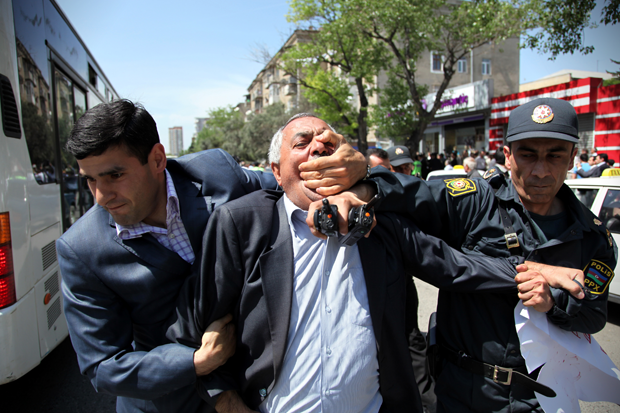
Narimanov Park, Baku, 15 May 2010. Police forcibly detain a political activist during an unsanctioned protest. Photograph by Abbas Atilay
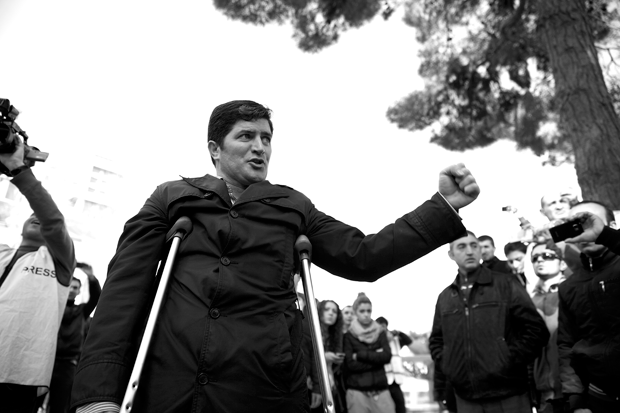
Fountain Square, Baku, 10 March 2013. A political activist during an unsanctioned demonstration protesting the deaths of military conscripts in non-combat situations. Authorities used excessive force to disperse the peaceful protest and detained more than 100 people. Photograph by Jahangir Yusif
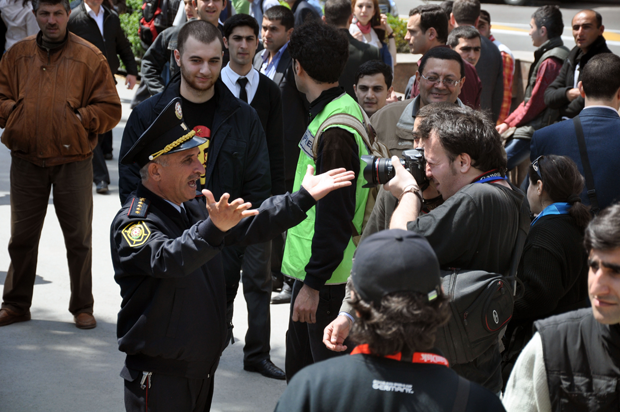
Sabir Park, Baku, 11 March 2011. During an unsanctioned political protest
in the wake of the Arab Spring, a police officer encourages journalists to take his photo. This was a rare move, which the photographer believes was intended to distract photographers from other aspects of the protest, such as police physically restraining protesters. Photograph by Mehman Huseynov
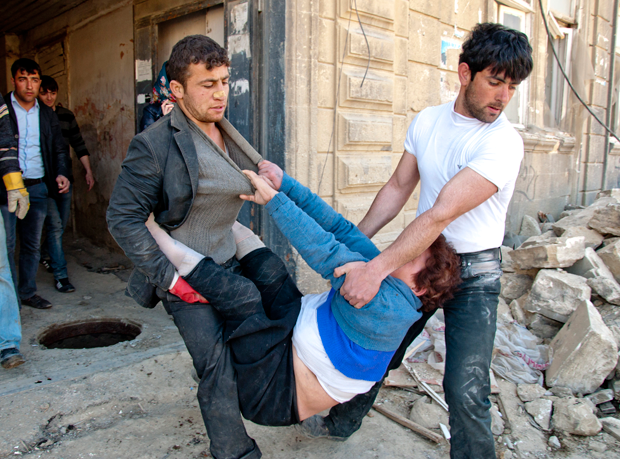
Shamsi Badalbayli Street, Baku, 2 April 2012. A resident is forcibly evicted from the area where the Winter Garden will be constructed. Approximately 300 complaints have been sent to the European Court of Human Rights related to forced evictions from this area. Photograph by Ahmed Muxtar
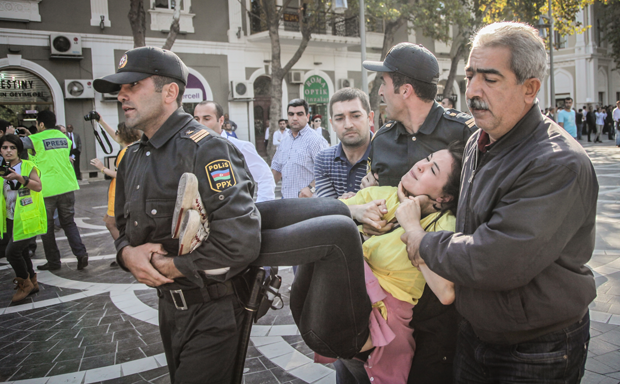
Fountain Square, Baku, 20 October 2012. Police detain a young opposition activist during an unsanctioned protest calling for parliament to be dissolved after a video was released showing an MP discussing the sale of parliamentary seats. Dozens of activists were detained during that protest. Photograph by Aziz Karimov
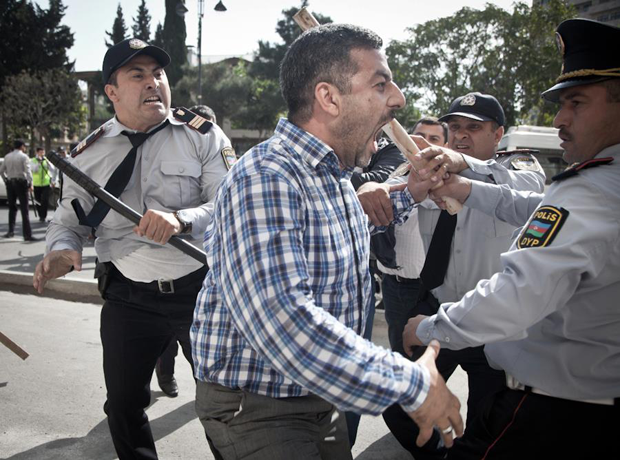
Hijab ban, 5 October 2013. Photograph by Aziz Karimov
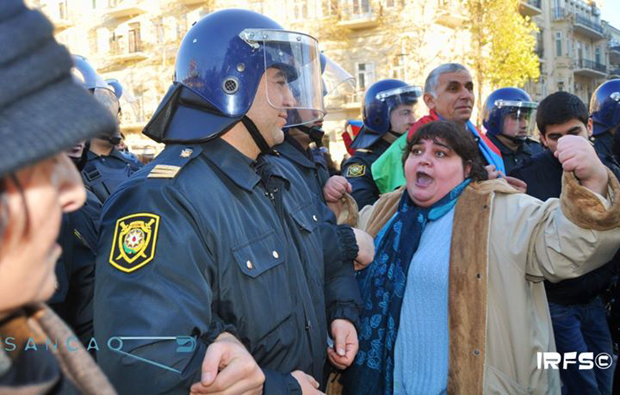
Investigative journalist Khadija Ismayilova confronts police. Photograph by Mehman Huseynov
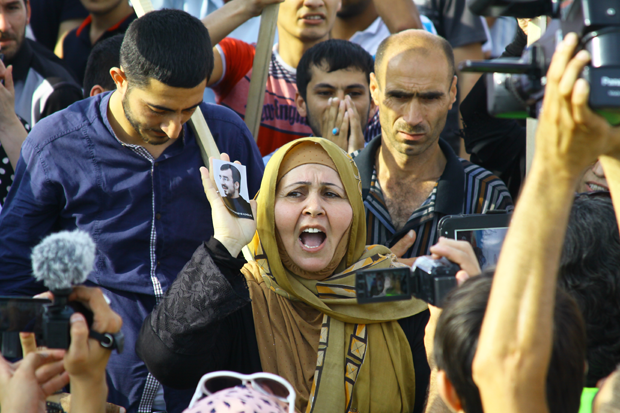
Nevreste Ibrahomova, head of Azerbaijan Islamic Party’s Women Council, holds the photo of an arrested Azerbaijani Islamist and chants freedom to him. Photograph by Shahla Sultanova
Photographers also face arrest and protracted legal action as a result of their work. Mehman Huseynov faces up to five years in prison on politically motivated hooliganism charges stemming from an altercation with a police officer during protests ahead of the Eurovision Song Contest in May 2012. The photographers featured in this story are among the few courageous individuals in Azerbaijan who remain willing to take on the risks associated with this work. They need international support and protection before they, too, become the subjects rather than the artists.”
Rasul Jafarov is the chairman of the Human Rights Club and project coordinator of the Art for Democracy Campaign. Rebecca Vincent is Art for Democracy’s advocacy director. She writes regularly on human rights issues in Azerbaijan
To find out more about the magazine and for subscription options, and read more about stories from the issue click here. These photographers will be part of an exhibition in London this winter. For more details, follow @art4democracy Join us to launch of Index on Censorship’s autumn issue on 15 October. To register for the event, click here.